- Home
- G. K. Chesterton
The Trees of Pride Page 14
The Trees of Pride Read online
Page 14
hehated such a public duty more bitterly than the rest. The others postedthemselves a little way behind the tree. Between the lines of thesemasked batteries the black figure of the doctor could be seen comingacross the green lawn, traveling straight, as a bullet, as he had donewhen he brought the bad news to the woodcutter. To-day he was smiling,under the dark mustache that was cut short of the upper lip, thoughthey fancied him a little pale, and he seemed to pause a moment and peerthrough his spectacles at the artist.
The artist turned from his easel with a natural movement, and then in aflash had captured the doctor by the coat collar.
"I arrest you--" he began; but Doctor Brown plucked himself free withstartling promptitude, took a flying leap at the other, tore off hissham beard, tossing it into the air like one of the wild wisps of thecloud; then, with one wild kick, sent the easel flying topsy-turvy, andfled like a hare for the shore. Even at that dazzling instant Paynterfelt that this wild reception was a novelty and almost an anticlimax;but he had no time for analysis when he and the whole pack had to followin the hunt; even Treherne bringing up the rear with a renewed curiosityand energy.
The fugitive collided with one of the policemen who ran to head himoff, sending him sprawling down the slope; indeed, the fugitive seemedinspired with the strength of a wild ape. He cleared at a bound therampart of flowers, over which Barbara had once leaned to look at herfuture lover, and tumbled with blinding speed down the steep path upwhich that troubadour had climbed. Racing with the rushing wind they allstreamed across the garden after him, down the path, and finally on tothe seashore by the fisher's cot, and the pierced crags and caverns theAmerican had admired when he first landed. The runaway did not, however,make for the house he had long inhabited, but rather for the pier, as ifwith a mind to seize the boat or to swim. Only when he reached the otherend of the small stone jetty did he turn, and show them the pale facewith the spectacles; and they saw that it was still smiling.
"I'm rather glad of this," said Treherne, with a great sigh. "The man ismad."
Nevertheless, the naturalness of the doctor's voice, when he spoke,startled them as much as a shriek.
"Gentleman," he said, "I won't protract your painful duties by askingyou what you want; but I will ask at once for a small favor, which willnot prejudice those duties in any way. I came down here rather ina hurry perhaps; but the truth is I thought I was late for anappointment." He looked dispassionately at his watch. "I find there isstill some fifteen minutes. Will you wait with me here for that shorttime; after which I am quite at your service."
There was a bewildered silence, and then Paynter said: "For my part, Ifeel as if it would really be better to humor him."
"Ashe," said the doctor, with a new note of seriousness, "for oldfriendship, grant me this last little indulgence. It will make nodifference; I have no arms or means of escape; you can search me if youlike. I know you think you are doing right, and I also know you will doit as fairly as you can. Well, after all, you get friends to help you;look at our friend with the beard, or the remains of the beard. Whyshouldn't I have a friend to help me? A man will be here in a fewminutes in whom I put some confidence; a great authority on thesethings. Why not, if only out of curiosity, wait and hear his view of thecase?"
"This seems all moonshine," said Ashe, "but on the chance of any lighton things--well, from the moon--I don't mind waiting a quarter of anhour. Who is this friend, I wonder; some amateur detective, I suppose."
"I thank you," said the doctor, with some dignity. "I think you willtrust him when you have talked to him a little. And now," he added withan air of amiably relaxing into lighter matters, "let us talk about themurder.
"This case," he said in a detached manner, "will be found, I suspect,to be rather unique. There is a very clear and conclusive combination ofevidence against Thomas Burton Brown, otherwise myself. But there is onepeculiarity about that evidence, which you may perhaps have noticed.It all comes ultimately from one source, and that a rather unusual one.Thus, the woodcutter says I had his ax, but what makes him think so? Hesays I told him I had his ax; that I told him so again and again. Oncemore, Mr. Paynter here pulled up the ax out of the well; but how? Ithink Mr. Paynter will testify that I brought him the tackle for fishingit up, tackle he might never have got in any other way. Curious, isit not? Again, the ax is found to be wrapped in lint that was in mypossession, according to the fisherman. But who showed the lint to thefisherman? I did. Who marked it with large letters as mine? I did. Whowrapped it round the handle at all? I did. Rather a singular thing todo; has anyone ever explained it?"
His words, which had been heard at first with painful coldness werebeginning to hold more and more of their attention.
"Then there is the well itself," proceeded the doctor, with the same airof insane calm. "I suppose some of you by this time know at least thesecret of that. The secret of the well is simply that it is not a well.It is purposely shaped at the top so as to look like one, but it isreally a sort of chimney opening from the roof of one of those cavesover there; a cave that runs inland just under the wood, and indeed ISconnected by tunnels and secret passages with other openings miles andmiles away. It is a sort of labyrinth used by smugglers and such peoplefor ages past. This doubtless explains many of those disappearances wehave heard of. But to return to the well that is not a well, in casesome of you still don't know about it. When the sea rises very high atcertain seasons it fills the low cave, and even rises a little way inthe funnel above, making it look more like a well than ever. The noiseMr. Paynter heard was the natural eddy of a breaker from outside, andthe whole experience depended on something so elementary as the tide."
The American was startled into ordinary speech.
"The tide!" he said. "And I never even thought of it! I guess that comesof living by the Mediterranean."
"The next step will be obvious enough," continued the speaker, "to alogical mind like that of Mr. Ashe, for instance. If it be asked why,even so, the tide did not wash away the Squire's remains that had lainthere since his disappearance, there is only one possible answer. Theremains had NOT lain there since his disappearance. The remains had beendeliberately put there in the cavern under the wood, and put there AFTERMr. Paynter had made his first investigation. They were put there, inshort, after the sea had retreated and the cave was again dry. That iswhy they were dry; of course, much drier than the cave. Who put themthere, I wonder?"
He was gazing gravely through his spectacles over their heads intovacancy, and suddenly he smiled.
"Ah," he cried, jumping up from the rock with alacrity, "here is theamateur detective at last!"
Ashe turned his head over his shoulder, and for a few seconds did notmove it again, but stood as if with a stiff neck. In the cliff justbehind him was one of the clefts or cracks into which it was everywherecloven. Advancing from this into the sunshine, as if from a narrow door,was Squire Vane, with a broad smile on his face.
The wind was tearing from the top of the high cliff out to sea, passingover their heads, and they had the sensation that everything was passingover their heads and out of their control. Paynter felt as if his headhad been blown off like a hat. But none of this gale of unreason seemedto stir a hair on the white head of the Squire, whose bearing, thoughself-important and bordering on a swagger, seemed if anything morecomfortable than in the old days. His red face was, however, burnt likea sailor's, and his light clothes had a foreign look.
"Well, gentlemen," he said genially, "so this is the end of the legendof the peacock trees. Sorry to spoil that delightful traveler's tale,Mr. Paynter, but the joke couldn't be kept up forever. Sorry to put astop to your best poem, Mr. Treherne, but I thought all this poetry hadbeen going a little too far. So Doctor Brown and I fixed up a littlesurprise for you. And I must say, without vanity, that you look a littlesurprised."
"What on earth," asked Ashe at last, "is the meaning of all this?"
The Squire laughed pleasantly, and even a little apologetically,
"I'm afraid I'm fond of p
ractical jokes," he said, "and this I supposeis my last grand practical joke. But I want you to understand that thejoke is really practical. I flatter myself it will be of very practicaluse to the cause of progress and common sense, and the killing of suchsuperstitions everywhere. The best part of it, I admit, was the doctor'sidea and not mine. All I meant to do was to pass a night in the trees,and then turn up as fresh as paint to tell you what fools you were. ButDoctor Brown here followed me into the wood, and we had a little talkwhich rather changed my plans. He told me that a disappearance for a fewhours like that would never knock the nonsense on the head; most peoplewould never even hear of it, and those who did would say that one nightproved nothing. He showed me a

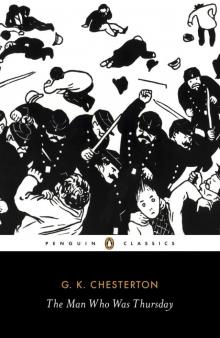 The Man Who Was Thursday: A Nightmare
The Man Who Was Thursday: A Nightmare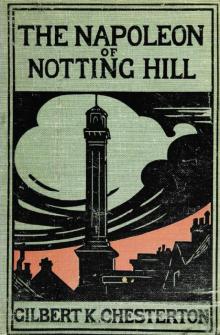 The Napoleon of Notting Hill
The Napoleon of Notting Hill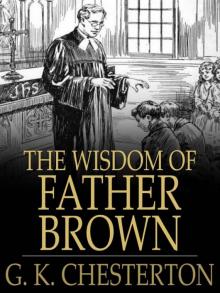 The Wisdom of Father Brown
The Wisdom of Father Brown G K Chesterton- The Dover Reader
G K Chesterton- The Dover Reader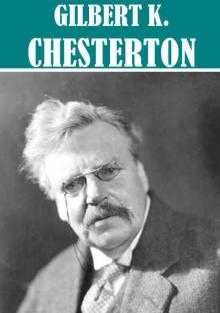 The Essential G. K. Chesterton
The Essential G. K. Chesterton The Trees of Pride
The Trees of Pride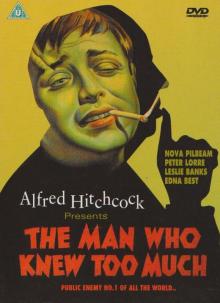 The Man Who Knew Too Much
The Man Who Knew Too Much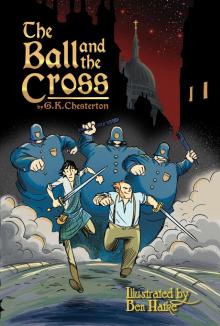 The Ball and the Cross
The Ball and the Cross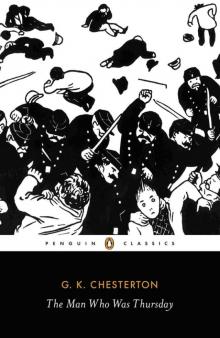 The Man Who Was Thursday (Penguin ed)
The Man Who Was Thursday (Penguin ed)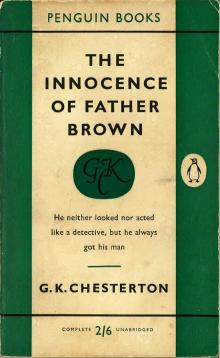 The Innocence of Father Brown
The Innocence of Father Brown The Victorian Age in Literature
The Victorian Age in Literature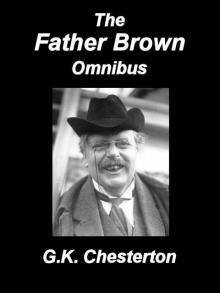 Father Brown Omnibus
Father Brown Omnibus Murder On Christmas Eve
Murder On Christmas Eve The Blue Cross
The Blue Cross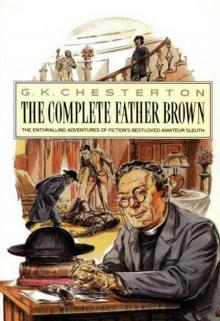 The Complete Father Brown Mysteries Collection
The Complete Father Brown Mysteries Collection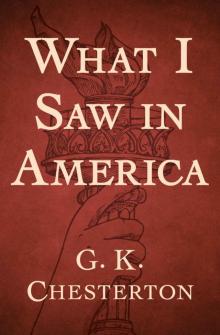 What I Saw in America
What I Saw in America